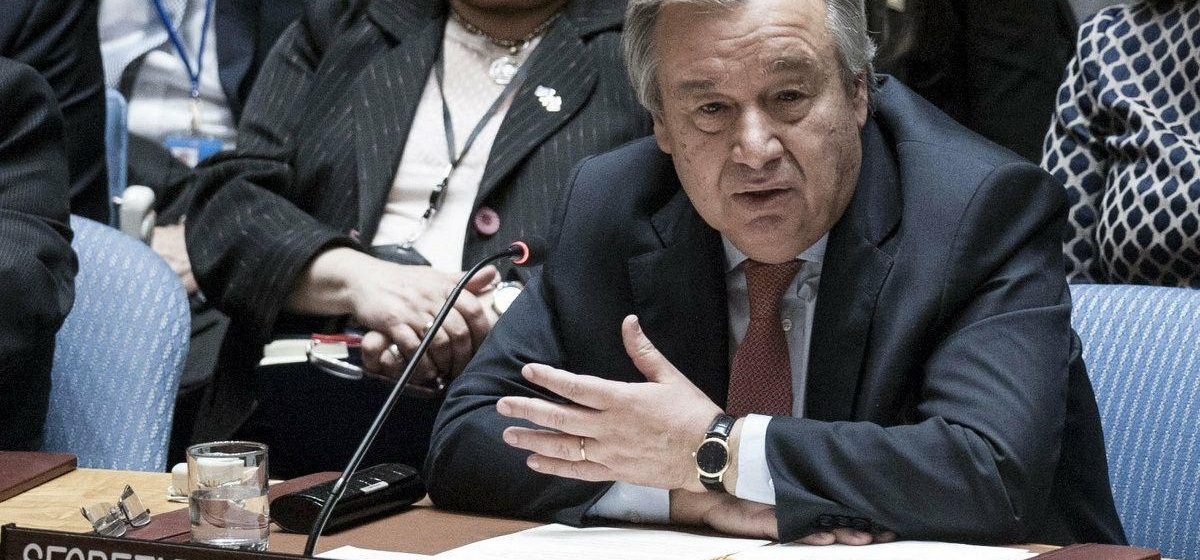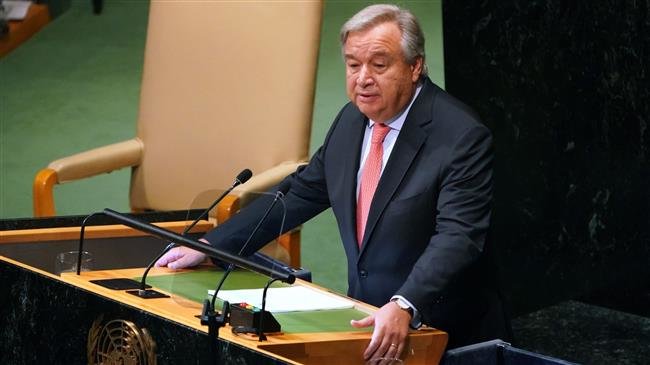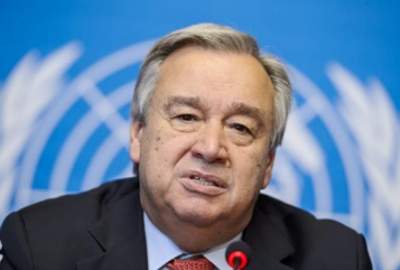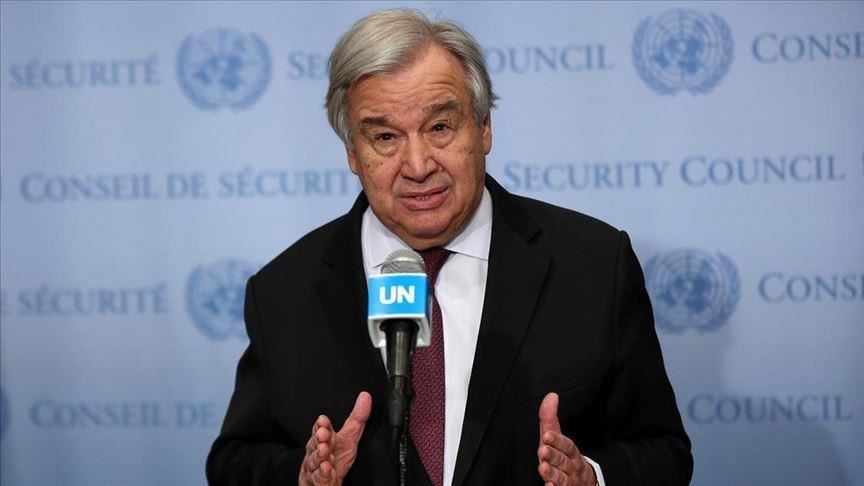The security situation in Afghanistan remains “volatile and unpredictable” while the humanitarian conditions are highly concerning, said the latest quarterly report by the UN Secretary-General Antonio Guterres.
Publish dateSunday 21 June 2020 - 14:08
Story Code : 212600
The report details all the development in Afghanistan and the UN activities in the country. It will be presented to the UN Security Council on June 25.
Guterres said he hopes that Afghanistan can build on the positive momentum and move united towards future intra-Afghan negotiations and recognize the historic opportunity for a peaceful resolution to the conflict.
On Security
The report says that while preparations for the peace process were underway, attacks from the Taliban “persisted” as they rejected calls for a ceasefire.
“The number of reported armed clashes returned to established trends following the one-week nationwide reduction in violence in February,” it says.
While the last week of February has been noted for its lowest level of violence in a decade, but before and after that violence continued. The UN Assistance Mission in Afghanistan (UNAMA) recorded 5,543 security-related incidents between February 7 and May 14. The highest number of incidents occurred in the southern region, followed by the northern and eastern regions, with those three regions accounting for 59% of all incidents.
There were 3,422 armed clashes of which 95% were initiated by “anti-government elements.” There was also a 22% increase in the number of attacks using an improvised explosive device (IED) when compared to 2019.
UNAMA also documented 1,293 civilian casualties between January to end of March. Since the week-long ceasefire at the end of February, the violence accelerated and there was a subsequent increase in civilian casualties noted.
“The disturbing increase in violence since March has continued to take the lives of civilians, among them women, children and newborns,” Guterres noted.
Anti-government elements were responsible for 55% of the documented civilian casualties, of which 39% were attributed to the Taliban, which was an increase compared to 2019. This was due to a hike in targeted killings and summary execution incidents.
On humanitarian conditions
“Sustained conflict, natural disasters, chronic poverty, food insecurity and the added burden of the COVID-19 pandemic caused increasing suffering for people across Afghanistan,” the report reads.
The Secretary General has expressed his concern about the rising food insecurity and impact of the pandemic on the economic situation.
“I am highly concerned about the economic prospects for Afghanistan and the effects of deprivation and underemployment on the health and welfare of the population,” Guterres said.
Through April and May, around millions of people in Afghanistan were either in crisis or at emergency levels of food insecurity.
The number of undocumented returnees has also surged from cities in Iran and Pakistan which had been severely affected by COVID-19. Between February 15 and May 20, there were 241,499 undocumented returnees and 318 refugee returnees.
Since the end of February, more than 12,000 people have been newly displaced.
The estimated number of people in need of humanitarian assistance has increased from 9.4 million at the beginning of 2020 to 14 million. UN partners are seeking $1.1 billion to provide life-saving help to 11.1 million people.
“Economic inactivity, falling incomes and reduced consumption will push many of the 35 million people who are already living on less than $2 a day to the fringes of survival,” Guterres observed.
He called for international support from all stakeholders in the preparations for the 2020 ministerial pledging conference on Afghanistan.
Guterres said he hopes that Afghanistan can build on the positive momentum and move united towards future intra-Afghan negotiations and recognize the historic opportunity for a peaceful resolution to the conflict.
On Security
The report says that while preparations for the peace process were underway, attacks from the Taliban “persisted” as they rejected calls for a ceasefire.
“The number of reported armed clashes returned to established trends following the one-week nationwide reduction in violence in February,” it says.
While the last week of February has been noted for its lowest level of violence in a decade, but before and after that violence continued. The UN Assistance Mission in Afghanistan (UNAMA) recorded 5,543 security-related incidents between February 7 and May 14. The highest number of incidents occurred in the southern region, followed by the northern and eastern regions, with those three regions accounting for 59% of all incidents.
There were 3,422 armed clashes of which 95% were initiated by “anti-government elements.” There was also a 22% increase in the number of attacks using an improvised explosive device (IED) when compared to 2019.
UNAMA also documented 1,293 civilian casualties between January to end of March. Since the week-long ceasefire at the end of February, the violence accelerated and there was a subsequent increase in civilian casualties noted.
“The disturbing increase in violence since March has continued to take the lives of civilians, among them women, children and newborns,” Guterres noted.
Anti-government elements were responsible for 55% of the documented civilian casualties, of which 39% were attributed to the Taliban, which was an increase compared to 2019. This was due to a hike in targeted killings and summary execution incidents.
On humanitarian conditions
“Sustained conflict, natural disasters, chronic poverty, food insecurity and the added burden of the COVID-19 pandemic caused increasing suffering for people across Afghanistan,” the report reads.
The Secretary General has expressed his concern about the rising food insecurity and impact of the pandemic on the economic situation.
“I am highly concerned about the economic prospects for Afghanistan and the effects of deprivation and underemployment on the health and welfare of the population,” Guterres said.
Through April and May, around millions of people in Afghanistan were either in crisis or at emergency levels of food insecurity.
The number of undocumented returnees has also surged from cities in Iran and Pakistan which had been severely affected by COVID-19. Between February 15 and May 20, there were 241,499 undocumented returnees and 318 refugee returnees.
Since the end of February, more than 12,000 people have been newly displaced.
The estimated number of people in need of humanitarian assistance has increased from 9.4 million at the beginning of 2020 to 14 million. UN partners are seeking $1.1 billion to provide life-saving help to 11.1 million people.
“Economic inactivity, falling incomes and reduced consumption will push many of the 35 million people who are already living on less than $2 a day to the fringes of survival,” Guterres observed.
He called for international support from all stakeholders in the preparations for the 2020 ministerial pledging conference on Afghanistan.
Source : Afghan Voice Agency(AVA)
avapress.net/vdcawunuw49n6i1.tgk4.html
Tags
Top hits












